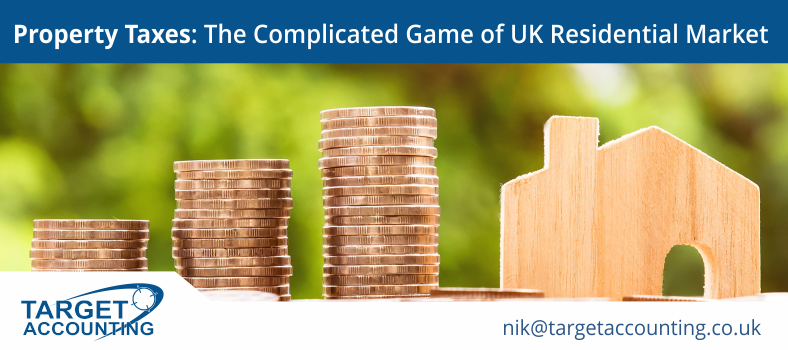The Property Taxation of the UK is quite famous because there is a long list of it; Stamp Duty Land Tax (Land and Building Transaction Tax in Scotland), Income Tax, Capital Gains Tax & Inheritance Tax and the Annual Tax on Enveloped Dwellings. If you are a UK resident or a non-UK resident, the game of taxes can be daunting in both scenarios.
Here’s all about the property taxes in the UK
The Housing market or the Residential market in the UK is definitely slowing down; however, it won’t crash down completely. The prices are crashing because of the falling sales due to the emergence of Brexit. But the scenario is such that there are many different markets not only in the country but also in the city within a square mile.
The property taxes are hovering all over. Where Manchester and Liverpool are growing, for Aberdeen and other parts of London the market is going reverse. And then, there are certain parts of the UK as well that are yet to see the rippling effects of the growth. Few of the cities are way higher in terms of pricing and some are at lower for a decade now.
The new taxes and regulations have hemmed buy-to-let investors, whereas owners face a high risk of fluctuating interest rates. The common question that is buzzing around is, “Is property still worth to invest?” It is been 4 years now and the number of housing transactions has been at the same level. London is a witness to a tremendous decrease in turnover. There aren’t many buyers on the ground. This means that the sellers need to settle down on a price and move on.
To chip in or not?
A home is no more home but an investment. Uncertainty brings along an opportunity. Nobody can predict how the sale would turn out or how far their budget would stretch. Hence, this is probably the best time to buy in the UK. The cost of investments is up after a series of regulatory changes and taxes. Stamp duty in the form of an extra 3% surcharge on buy-to-let properties is another factor adding burden to the UK Residential market. All the benefits that were in effect earlier have now been taken away on owning a buy-to-let property.
The Current Status of Taxes:
SDLT
Stamp Duty Land Tax (SDLT) is further bifurcated into two charging systems:
1. A property, if acquired in the name of an individual then the SDLT rate is charged on a stepped basis. Cliff edge basis does not exist anymore. If the value of the property is up to £125,000 – no SDLT will be charged.
- Between £125,000 to £250,000 – 2%
- Between £250,000 to £925,000 – 5%
- Between £925,000 to £1,500,000 – 10%
- Above £1,500,000 – 12%
2. Anyone buying a second property in the UK, including a buy to let property, would pay an additional 3% on top of the relevant standard rate band. The rates and thresholds are:
- 0% on properties under £40,000
- 3% between £40,001 and £125,000
- 5% between £125,000 and £250,000
- 8% between £250,000 and £925,0000
- 13% between £925,000 £1,500,000
- 15% on anything over £1,500,000
3. If a residential property costing more than £500,000 is acquired through a corporate structure, a flat rate of 15% would be charged on the entire amount. The only exception here is if the residential property is acquired through a property development company, SDLT would be charged at the same rate as in case of an individual.
ATED
The Annual Tax on Enveloped Dwellings (ATED) is an exclusive UK tax, payable by companies that own UK residential property. This very tax shall be paid annually in advance and has other terms and conditions. Late payment attracts a penalty. The annual charges and thresholds can be checked here.
Disposal of the Property
All the residential properties, except the one that is used by the owner as his principal private residence, is subject to Capital Gains Tax (CGT) of 18% or 28% on disposal.
IHT
UK Inheritance Tax Regime (IHT) is applicable on all UK residential property, irrespective of the structure of ownership. IHT is the property tax chargeable at flat 40% on the market value at the time of death. The tax is valid and chargeable even if the property was gifted within 7 years prior to death (subject to taper relief). Many more amendments, taxes, and developments would be applicable in the year 2020.
The bottom line is when acquiring UK residential property, it is very important to take note of the ownership structure prior to any exchange of contracts. Another crucial noteworthy factor is careful planning to provide confidentiality and minimise tax liabilities. Examine all the existing structures and seek professional advice from our Property Tax Experts.
What the Future Holds?
How the housing would be the next year? It is the question that everyone is looking forward to an answer. Limited supply, unaffordable home-buying environment, growth in home prices, rising rates and taxes are all the factors making it difficult for renters to become home-buyers.
Despite all the facts and figures, it is anticipated that the housing market will see a rise in the number of first-time home-buyers.


